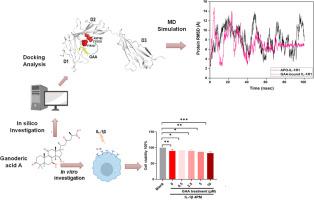Journal of Molecular Structure ( IF 4.0 ) Pub Date : 2023-12-27 , DOI: 10.1016/j.molstruc.2023.137431 Mona Alrasheed Bashir , Chang-Sheng Shao , Mohnad Abdalla , Xiuping Lin , Lamei Li , Yahui Wu , Qing Huang

|
Interleukin 1 (IL-1)-mediated tumor microenvironmental inflammation plays a significant role in cancer development. Despite the recognition of interleukin-1β (IL-1β) and its receptor interleukin-1 receptor 1 (IL-1R1) as crucial targets for cancer treatment, their inhibitors have shown limited efficacy in clinical trials. Ganoderma lucidum, a traditional Chinese medicine known for its health benefits, longevity promotion, and anti-cancer properties, has gained attention. Ganoderic acid A (GAA), a naturally occurring triterpene in Ganoderma lucidum, possesses anti-inflammatory and anti-cancer activities. However, its anti-inflammatory role in the tumor microenvironment is still elusive. To address this, we investigated the interaction of GAA to IL-1β and IL-1R1, and its impact on the binding of IL-1β to IL-R1 in human cancer cells. The research utilized molecular docking, molecular dynamics (MD) simulation, differential scanning fluorimetry (DSF), cytotoxicity assays, caspase 3 activity, and immunofluorescence assays. The results revealed that the GAA could bind and stabilize the trajectory of IL-1R1 at domains 1 and 2. GAA thermally stabilized IL-1R1 and inhibited the viability of A549 and HeLa cells in a dose-dependent manner. Furthermore, GAA exhibited apoptotic activity and significantly inhibited the binding of IL-1β to IL-1R1 in cancer cells. These findings shed new light on the interaction between GAA and interleukins, providing insights into the development of novel natural inhibitors for targeting the inflammatory tumor microenvironment (TME).
中文翻译:

灵芝酸 A 靶向 IL-1R1 并破坏人类癌细胞中 IL-1β 的结合
白介素 1 (IL-1) 介导的肿瘤微环境炎症在癌症发展中发挥着重要作用。尽管白细胞介素-1β (IL-1β) 及其受体白细胞介素-1 受体 1 (IL-1R1) 被认为是癌症治疗的重要靶点,但它们的抑制剂在临床试验中显示出有限的疗效。灵芝是一种传统中药,因其保健功效、延年益寿和抗癌特性而受到关注。灵芝酸 A (GAA) 是灵芝中天然存在的三萜,具有抗炎和抗癌活性。然而,其在肿瘤微环境中的抗炎作用仍然难以捉摸。为了解决这个问题,我们研究了 GAA 与 IL-1β 和 IL-1R1 的相互作用,及其对人类癌细胞中 IL-1β 与 IL-R1 结合的影响。该研究利用了分子对接、分子动力学 (MD) 模拟、差示扫描荧光测定 (DSF)、细胞毒性测定、Caspase 3 活性和免疫荧光测定。结果表明,GAA 可以在结构域 1 和 2 结合并稳定 IL-1R1 的轨迹。GAA 热稳定 IL-1R1,并以剂量依赖性方式抑制 A549 和 HeLa 细胞的活力。此外,GAA 表现出细胞凋亡活性,并显着抑制癌细胞中 IL-1β 与 IL-1R1 的结合。这些发现为 GAA 和白细胞介素之间的相互作用提供了新的线索,为开发针对炎症肿瘤微环境 (TME) 的新型天然抑制剂提供了见解。






























 京公网安备 11010802027423号
京公网安备 11010802027423号